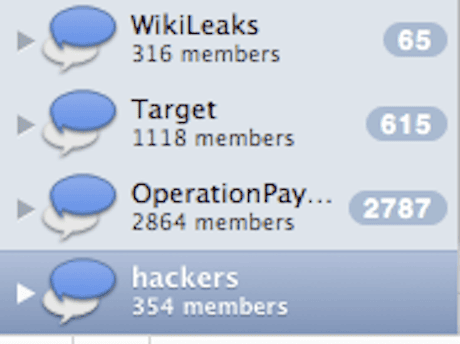"Just don't use my name, OK, please?" said the person on the other end of the phone. "I don't want this to get out." His cause for concern? He'd helped produce some innocuous content - nothing actionable legally in any way - for "Anonymous", the vague online group spawned by 4Chan's /b/ forums.
The real reason he was worried wasn't that he thought law enforcement might find out. He was worried about other people in Anonymous finding out - because in that group, to stand up and identify yourself is seen as the worst thing you can do. Stripping off the Anonymous mask is viewed as a form of betrayal by the wider group.
How do I know? I spent a big chunk of Thursday inside the Internet Relay Chat forums where Anonymous makes its decisions - and what a mess that turns out to be. I was led there not by the person I was speaking to above, but by someone else who had got in touch because he felt that the group was being misrepresented, and that the public comments of "Coldblood" were rubbish, the commentary of someone who had no right to be called a "spokesman" for the group.
One thing both my interviewees had in common is recent contact with higher education: one is still a student in the UK, while the other recently left a British university. They're living in completely different countries (one in the UK, one in the EU) but both frequent the same IRC channels, oblivious of each other.
My main guide we'll call an0n (his chosen name for our conversation, though not his online handle). He's been using /b/ for about four years. He showed me how to get onto the IRC rooms where the chatter was trying to identify the next target - this at a time when the Mastercard web server had just been knocked offline.
The choosing of a target is a messy process - you could barely call a process except that it has an outcome (or sometimes none). You have to know the right server, and the right rooms on those servers. Nobody entirely trusts anyone (you'll see accusations that people are "Feds") and about the only people who seem legit are the occasional journalists who've found their way there and are asking questions like "who are you attacking next?".
They get lost in the flow: these chatrooms have up to 3,000 people, and the questions come in a stream and pass by in a river of commentary, observations, links and jokes. You wouldn't say that it's directed; more that it swings in various directions like a flock of birds, apparently aware of its own vector but unable to force it on any of its members.
My guide pointed out that the Anonymous group is conflicted from its core, because it's an outgrowth of people who themselves have come from /b/, which means that many aren't that interested in morality. They're in it for the lulz - or they're into whatever Anonymous and its associated scenes are doing for the money. Which means that the idea of attacking Amazon, or PayPal, or Twitter, over a moral or ethical issue is something of a new experience for the group. Usually they're into tormenting people.
"I've seen some people do some fucked up shit 'for the lulz'," an0n told me. "People trolling RIP pages on Facebook, missing girls pages. It's the most racist, xenophobic place on the internet. It's addictive, and it pisses [outside] people off."
And there's the money too. That can mean circulating cracked software, serial keys, keygen [licence key generating] software, logins and passwords for paid sites, and so on. Again, morals and ethics aren't uppermost.
"If you had a DVD of Harry Potter 7 Part 1, you would make 12-15 grand selling it to the [hacker] scene [on IRC]", my guide explained. He didn't want to give any details other than that he's a university student in the UK: "I've been pirating since I was 12", he says, when a sibling showed him how to pirate Nintendo 64 games.
I did confirm, in a roundabout way, various details (he is a student, and certainly on /b/), but agreed not to reveal any more about his identity - not his age or real online handle - because, just like the other person I spoke to, he is worried about online retribution.
The real thing about Anonymous, he says, is that it's like Fight Club, where you don't say that you're in it, and you certainly don't speak as if you're representing it, or know what it's going to do - as Coldblood (Guardian audio interview, BBC Today transcript) did last week. Coldblood's name is mud in those forums and on /b/. "He's a fraud," insisted my contact, who wanted to show what it's really like inside there. (Although the reality turns out to be that Coldblood isn't a fake; he's just someone who has offended the Anonymous hivemind by representing it. Which worker bee speaks for all of them?)
An0n is disdainful of the people who are really behind Anonymous and on /b/: "In essence what we are dealing with here is a group of men with the brains of children, so naturally those of us looking to get something done are warring with a constant battle of one-upmanship."
Certainly, the chatrooms are overflowing with classic aggressive-male posturing, the sort that's so easy to do online: anyone you don't like or has done something you think is wrong is a "fag", nobody else there can ever have had sex, nobody cares about the outcomes of their actions. You're never going to mistake it for Mumsnet.
But there's the jostling crowd inside the chatrooms - and then there are the serious people who are actually making a difference. Even with 3,000 people in the group, that's going to make little difference to a site like Mastercard or Amazon. But an0n pointed out that there are more serious players in there: "I know a guy who is using a botnet of 25k computers to do this," he observed. Hired, I asked, or his own creation? "No idea," came the reply. "He used to hack a lot, so it could well be his. He's a scene hacker, which is as good as you get."
And he didn't think the attack on PayPal would really work, because it wouldn't garner the backing of those with the real hacker skills required: "we're all pirates - we all use PayPal on a daily basis. Plus [PayPal] met our demands [to release funds to Wikileaks]: the reason the attack took place was because they froze Assange's funds. They have unfrozen them due to Operation Payback." Plus, "there are plenty on /b/, largely American who wholeheartedly agree with the arrest of Assange."
In fact it's difficult - perhaps wrong - to call Anonymous a group. It is, but only in the loosest sense; it's more like a stampeding herd, not sure quite what it wants but certain that it's not going to put up with any obstacles, until it reaches an obstacle it can't hurdle, in which case it moves on to something else.
How long, I asked an0n, did he think the group would keep Amazon and PayPal in its sights? "One or two weeks," he guessed. In fact, it already looks like less than that - on Saturday a Twitter announcement seemed to suggest that it would instead try to distribute existing Wikileaks content via Bittorrent. So, three days of insurrection.
The other intriguing element about the group is the fear - it's the only useful word - expressed by people "inside" it about being linked to it. You have to think that it's a strange sort of group that suppresses acknowledgement of membership while professing to favour freedom.
But of course Anonymous isn't really about freedom; it doesn't have a manifesto as such. It's a loose collective mainly of teenagers with some time on their hands, and older people (almost all men) with more nous and considerably more technical skills.
Some readers might, at this point, say "well, they'll have grown up - in four or five years' time they'll all be busy with jobs and real life will have intruded - it's a self-limiting proposition."
However experience shows that the internet constantly renews itself: there's always a younger, impressionable generation joining which will push the barriers further than the previous ones. Before 1997, the problem was that every September the net would see an influx of new college and university students who'd not had internet access before, and would run around making stupid mistakes (often involving reposting "Make Money Fast" pyramid scams in the mistaken belief that they might work, and weren't illegal).
Then in 1999 or so came the first generation of higher education students who'd already used the net at home. They were also the Napster generation. Since then, every successive year has pushed access to the net earlier and earlier, meaning that what was novel to the previous one becomes commonplace for successors. Peer-to-peer? Done it. Bittorrent? Everyone does. Swarming attacks on sites? It's new this year, but it will be standard procedure in a year or two.
This generation of Anonymous members is going to grow up. But the idea won't go away.








Comments (…)
Sign in or create your Guardian account to join the discussion